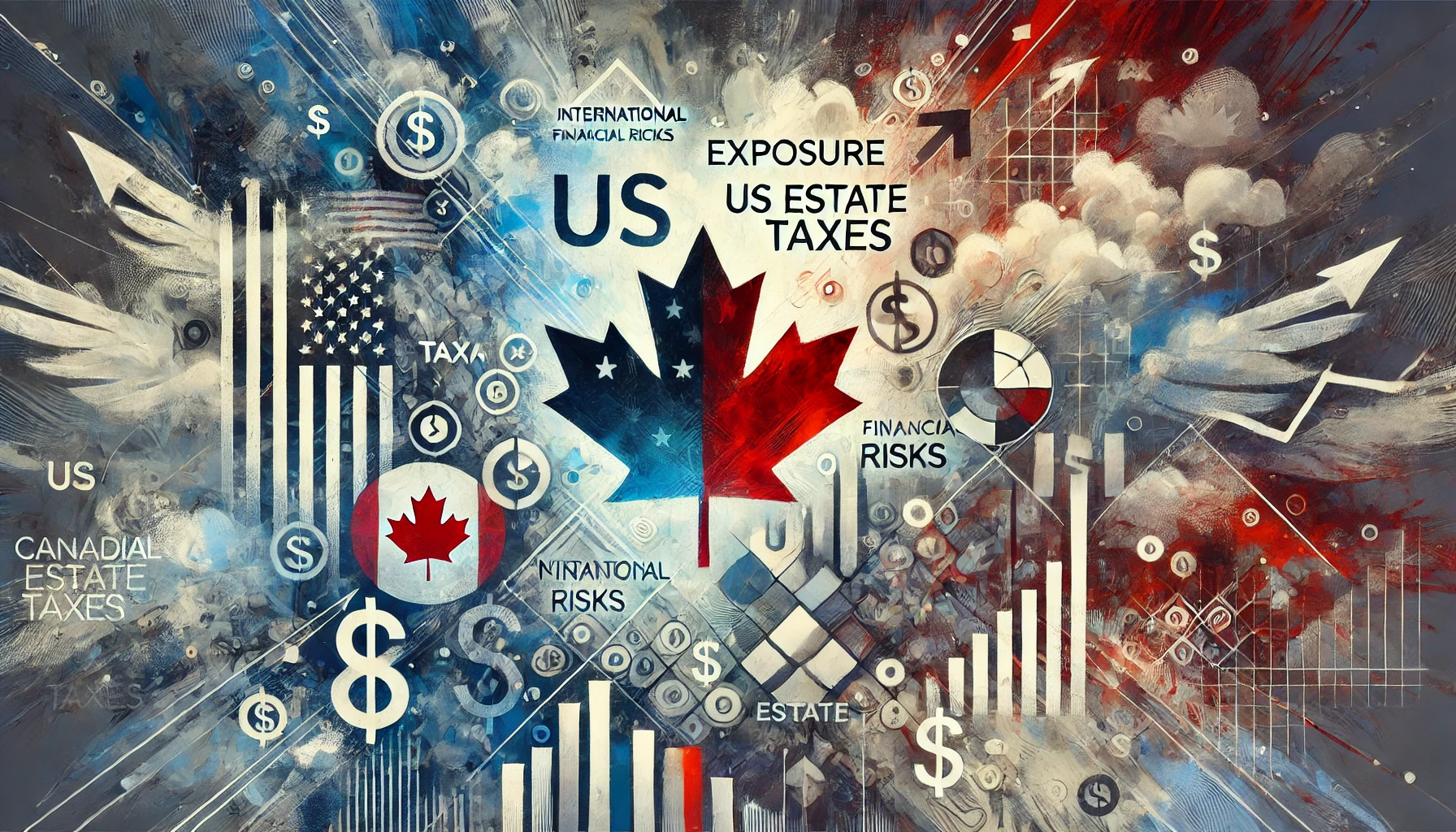Canadians might be surprised to learn they may be exposed to US estate taxes. This post describes the risks to Canadian investors and how they might protect themselves.
US Estate Taxes
When Canadians die owning US situated assets worth more than $60,000 USD, they are required to file a US estate return.
Then, if your total worldwide estate is more than $11.58 million USD, it may be subject to US estate tax. If your estate is less than $11.58 million USD, your estate will probably not be subject to US estate taxes.
What are considered “US situated assets”?
US situated assets are those assets located within the United States. US situated assets are those that have a US location or connection and can include the following:
- Vacation homes owned in your personal name or any other real estate owned in your personal name located in the United States
- A business owned in your personal name (shares of private corporations) registered and/or operating in the United States
- US listed stocks held in your personal name, whether held in a Canadian brokerage account or not
- Deposit and brokerage accounts held in your personal name with US banks, trust companies, credit unions, etc.
US ETFs trading on US exchanges are US situated assets. However Canadian ETFs holding US listed stocks are not US situated assets.
US stocks are held in registered, non-registered, or trusts are considered US situated assets.
When US stocks and other property are held in a Canadian corporation, they are considered property of the corporation not personal assets. This means stocks held within a corporation would not be subject to estate tax on the death of the shareholder.
How are US estate taxes calculated?
The US estate tax is based on your worldwide balance sheet. This means, US estate taxes apply to your assets located outside of the United States as well. For example, owning n a condo in Florida with a value of $500,000 USD will put you above the $60,000 USD threshold for US situated assets. So, the $20 million CAD worth of Canadian stocks you also own may be subject to US estate taxes. Your entire net worth (your Florida assets AND your Canadian stocks) may be subject to US estate taxes.
Here is the calculation at the time of writing:
To begin, a unified credit amount is calculated as the taxes that would be payable on the basic exclusion amount which is specified in s. 2010(c)(3) of the Internal Revenue Code. For 2020, the basic exclusion amount is US$11.58 million (adjusted annually for inflation) which provides a unified credit of US$4,577,800 (the amount of U.S. estate tax on assets with a fair market value of US$11.58 million).
If your total worldwide estate in 2020 is less than $11.58 million US (could be reduced to $3.5 million with Biden tax plan) at the time of death, you will probably not have to pay any US estate tax. Over that amount, your estate may be subject to tax.
The bottom line is that if you have US situated asset worth more than $60,000 USD at the time of death, and your estate is worth more than $11.58 million USD, you could be expected to pay US estate tax of up to 40% of the value of your estate.
Solutions
Obviously, Canadians without any further ties to the United States will likely want to take steps to shield their estates from US estate taxes. So, if you have more than $60,000 USD in US situated assets, below are some basic ways to protect yourself from US estate taxes.
It’s also worth noting that there is no ideal structuring method. Each way requires trade-offs and there are better and worse ways to hold US situated assets based on the type of asset (such as stocks, personal use real estate, income producing real estate, operating businesses, etc.).
When deciding how to protect your estate from US estate taxes, its important to consult with a lawyer and accountant who specialize in estate planning and have some experience with US taxes for the best advice.
Canadian Corporations
When you own US situated assets worth more than $60,000 USD, you can often transfer ownership of those US assets to a Canadian based corporation to protect yourself from US estate taxes. This method is simple from a compliance perspective and works particularly well if your only US situated asset are US listed stocks. The downside of using a corporation to hold your US stocks is it invites an additional layer of tax rules to your portfolio (i.e. the tax rules for corporations are different from the tax rules for individuals including different rates/ways to apply capital gains, interest, and dividends).
Canadian Resident Trusts
US situated assets can be owned by Canadian resident trusts created for holding those assets. Its important to ensure the trustees are Canadian and should likely be someone other than yourself. Otherwise, those assets held in the trust may be drawn into US estate filings anyway. Canadian resident trusts created for the purpose of holding US assets to shield an estate from US estate taxes should be drafted for this purpose. The 21-year rule on realizing capital gains may also apply to assets held inside trusts.
Hold Specific ETFs
Instead of holding ETFs traded in the US, hold ETFs traded in Canada. For example, if you currently hold an S&P 500 ETF traded on a US exchange, consider holding an S&P 500 ETF traded on a Canadian exchange. Canadian listed ETFs holding US stocks are not considered US situated assets.
Sell your US situated holdings
After considering all the alternatives, it might be best for you to simply avoid holding any US situated assets in your own name. Unless you have other important ties to the United States, this will ensure that your estate is not drawn into paying an US estate taxes.
Scenarios
Consider the following scenario of someone with an estate worth $50 million composed of the following assets:
- $5 million US stocks
- $20 million Canadian stocks
- $5 million bond funds & ETFs
- Shares in Canadian private corporations with fair market value of $15 million
- $3 million principal residence
- $2 million cottage
Since this person owns more than $60,000 USD worth of US stocks, their estate would be required to file a US estate return. This would expose the estate to US estate taxes because the worldwide value of the estate is over the $11.58 million amount.
Since this person has no other ties to the US, there are two easy ways to protect this person from US estate taxes. They can sell their US stocks or else replicate their US stock portfolio using Canadian listed ETFs containing US stocks. However, this could mean triggering capital gains from the sale of their US stocks.
Transfer Ownership
Another way is to transfer ownership of their US stocks to a Canadian based corporation (holdco). This method would avoid triggering capital gains taxes, but then require the owner to maintain books and records and separate accounts for their corporation holding the US stocks.
Consider another scenario of someone with a $100 million estate who owns the following assets:
- $74 million US stocks held inside a holding company based in Canada
- $20 million Canadian stocks held inside a holding company based in Canada
- $4 million Principal Residence
- $2 million condo in Florida
This person is also exposed to US estate taxes because their Florida condo is worth more than $60,000 USD. Ownership of the condo requires the estate to file a US estate return and could expose their entire estate to US estate taxes.
This person could transfer ownership of their Florida condo to a Canadian trust. But, the trust should be drafted specifically for this purpose and have trustees who are Canadian. In this case, the settlor could be the current owner, the trustees could be their two daughters who are Canadian resident taxpayers and the beneficiary of the trust could also be their two daughters. However, this trust is now required to file annual returns and keep books and records, and the 21-year rule on capital gains will also apply.
Your Family Office Should Be Helping You
Our family office works with lawyers and accountants who advise clients on their estate plans. These experts will bring the important topics to your attention and suggest ways for you to avoid US estate taxes. You may find there is no perfect solution, and oftentimes, estate planning means making trade-offs to achieve your goals.




